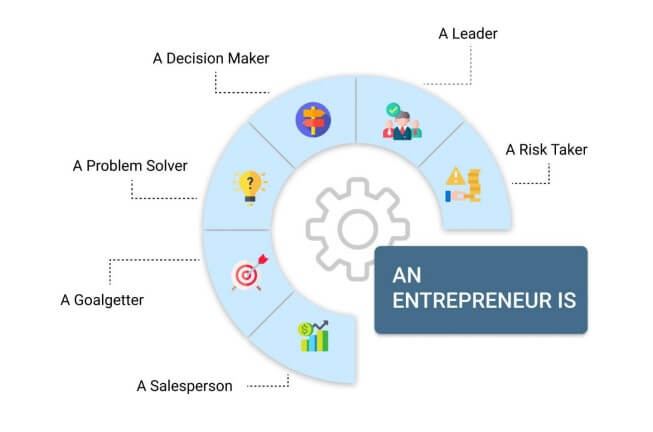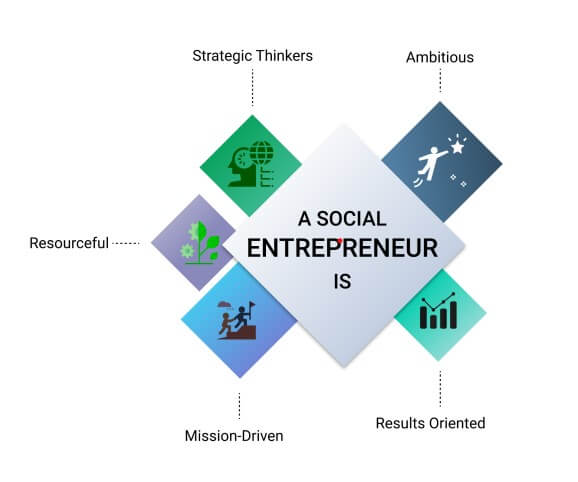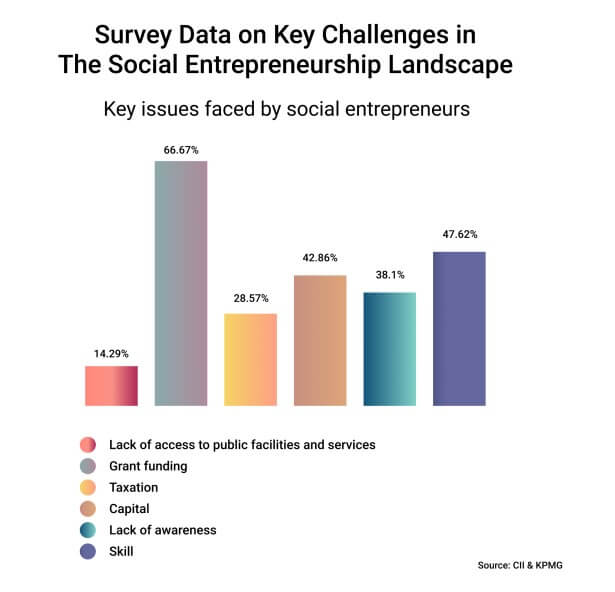In a pursuit towards finding out who are Social Entrepreneurs, let’s first see who are Entrepreneurs to bring forth a reasonable difference between the two.
An entrepreneur is someone who creates a new business - who bears most of the risks and is entitled to most of the rewards. Entrepreneurs play a distinctive role in any economy, using their skill-set to anticipate needs and are bringing innovative ideas to reality through investments made correctly and timely.
Entrepreneurs bear any risk that comes with starting up and sustaining business. They assume every responsibility that might come up in the course of business which might be caused by either change in time or quality. They are always ready for emergencies; and should competitors emerge, think of strategies to outshine them..
Entrepreneurs must be good salesmen. If one cannot sell as an entrepreneur, one cannot succeed. They are responsible for marketing and advertising their products or services. An exchange of goods and services is the basic skeleton of business, and which is why an Entrepreneur will usually have this skill mastered
Being an entrepreneur means being a goal getter. Entrepreneurs not only set specific goals, but also keep a stable approach to achieve them within set time limits. Robert Kiyosaki says, “Most people know how to set goals, few people know how to achieve them, that is how to identify an entrepreneur.” The ultimate goals set by entrepreneurs can often be overbearing to ordinary people.
Being a good leader sets the base of being a successful entrepreneur. This is a challenge because leading people and being vulnerable enough to share your vision with them with as much passion as you have can be difficult. Making the right decision that will positively impact you, your business and your team is what sets you apart from the regular. Outstanding leaders go out of their way to boost the self-esteem of their personnel. “If people believe in themselves, it’s amazing what they can accomplish” – Sam Walton.
Entrepreneurs determine the objectives in accordance to current needs. They choose and maintain the potential investors or financiers of the enterprise and also manage funds that are available. They make sure that the business venture has a good relationship with public authorities and society in general. They estimate the market needs and act accordingly, incorporating appropriate changes to strategies, trying to make most profits while providing growth to the enterprise
Entrepreneurs are active problem solvers making sure that constant challenges are overcome through tangible solutions. By identifying the constant change in market needs and predicting what the future may look like, they bring forth different solutions. They innovate every step of the way, thereby discovering new possibilities and new ways of doing old things along the way

Social entrepreneurs are those who seek new areas of enterprise and innovation while keeping social responsibility at the core of their business decisions. They feel an obligation to contribute to the well being of the society in which they operate, and that is their primary objective. For social entrepreneurs, profit making always takes a back-seat.
Being a Social Entrepreneur means doing business with a heart. A Social Entrepreneur has the vision to identify need gaps in social welfare, he has enough passion to counter all the challenges he may face while filling that need gap and is motivated by a sense of responsibility towards a larger purpose and a cause that they feel strongly for
The start of such a venture is after recognizing the prevalence of issues in the society and creating tangible solutions to address them using entrepreneurial skill-set. Their overall goal is always to make a positive impact while constantly churning capital investment to push their cause further.
Marked by ambition and perseverance, they are persistent at tackling major challenges and social issues, offering innovations that catapult change through the length and depth of society. Rather than depending upon the government to come up with solutions, Social Entrepreneurs will make the analytics and find solutions by changing the entire system while persuading the governing body, corporates and sometimes the societies that share similar goals to join them in support of their initiatives.
Social Entrepreneurs dedicate a lot of time and energy in making a positive impact and follow their passions which create permanent changes for the good of all.
Their causes, more often than not, are complex. However, they need to make sure that these causes are filtered down to their simplest form to be understandable by the masses. This makes it easy for people to join their cause. Social Entrepreneurs also recruit local changemakers who then become a role model and a voice for other like-minded enthusiasts sharing similar passions.
The goals of Social Entrepreneurs often speak of wide scale changes in the society that are created for the betterment of underprivileged sections of the society. They believe in their cause passionately and often have an action plan in mind. Their operations are in, but not limited to, non-profit organizations, charities, development banks and organizations that mix for-profit and not-for-profit work.
Social Entrepreneurs focus on enhancing social value more than profits and revenue. Their business strategy is immensely different from doing regular business where the main focus is generating profits limited to governmental guidelines. Social Entrepreneurs, in fact, bring to light the causes that might sometimes be in the shadows from the government. Even though profits might not be the central cause of the venture by a social entrepreneur, it is an important objective. To create further impact, Social Entrepreneurs often look for investments that will drive home their sincere objectives.
Social Entrepreneurs often see things that are missed by the masses. They are able to identify opportunities to bring about significant improvements in the business while creating new opportunities that are of deep social value. They make positive contributions and changes in society through strategies that harmonize welfare, profits and impact.
Not all Social Entrepreneurs come with a sound support system. They often start with a challenging vision with very little means to achieve it. This is when thriftiness helps. Social Entrepreneurs are extremely resourceful and aim at achieving their objectives with what they can access. They are skilled at persuasion and have more than enough passion to share their ideas convincingly. This is how they are able to get people, societies, organizations and even government bodies on board when they are implementing their vision.
Being simply someone with a vision of welfare is certainly not enough to be a Social Entrepreneur. When ideas turn into impacts in terms of facts and figures, that’s when the changes they want to see actually happen. Social Entrepreneurs focus on end results, transformations of present realities thereby opening up new opportunities for those in need and those marginalized sections that are often ignored.

The feeling of having made a positive impact on society is deeply enriching and beyond comparison. Being a Social Entrepreneur is hard without a doubt, but it is also a fact that more and more people travel down this unruly path. Being a Social Entrepreneur can be a deeply rewarding and fulfilling experience giving one joy in being a part of something larger than oneself and truly impactful
India has endless opportunities that will make a positive impact. With a population that is bursting at the seams, there is an imbalance in the distribution of resources and work that pays justifiably. This is where Social Entrepreneurship comes to the rescue.
Having an idea that will lead to the wellbeing of the society makes it more likely that you will have people and organizations by your side to be able to fulfill the same. Convincing people of a business that will also leave a lasting impression on the betterment of the world as we know it can make all the difference when it comes to investments and donations.
In India, again because of the population, a lot of matters of concern often go unnoticed and many innovations do not take place simply because of the lack of resources. Social Entrepreneurs bring to light such innovations and do so with their limited resources. This is the reason why they also get help from like-minded individuals and institutions.
When an innovation is for the betterment of society, marketing is easy. There are better chances that people and media will pay attention when a matter relates directly to solving a relevant problem
The media in India is deeply appreciative of innovations that are focussed on uplifting the society, hence Social Entrepreneurs and the ideas they stand for find a lot of support in the market as well. With awareness and an inclination towards sustainable choices on the rise, the ordinary individual too is now ready to pitch in towards the larger cause if the right information reaches him.
Social Entrepreneurs have a team as dedicated as them because they come together towards a common goal - the betterment of the underprivileged. This makes for a group of employees who are motivated to achieve and work their very best always.
With a lack of jobs in India; but no dearth in young, hard working talent, Social Entrepreneurs don't find it too difficult to find a workforce that will stand by them through thick and thin. Our deep rooted culture that often talks of sharing, caring and giving also makes employees that are not easily wavered from their goals towards welfare.
Being a Social Entrepreneur, you can also be sure that you will be adding to the functioning of the economy generating income while also promoting your concept of social welfare and stand by what you believe in the most
Though India’s economy is volatile and dynamic, it is also ever growing. Being a Social Entrepreneur gives you a chance to be part of this synergy and marks your contribution because you are associated with a noble cause.
While we may have plenty of human resources owing to our large and young population, there is still a shortage of skilled people. Certain ideas that could possibly change the social landscape of India are not turned to reality simply because of lack of skill. A lot of the population of India still remains uneducated which also keeps them from reaping the benefits of what the Social Entrepreneurs try to do for them.
Being employed in the social sector also means lower profit margins and long revenue cycles. This continues to be one of the main causes why certain enterprises fail to get the talent they need on-board to develop products and services. A lot of social good can be done by tapping social media and technology, which requires a skill-set that our economically emerging country still lacks. This brings forth a lack of quality and consistency in products and services.
The main challenge for any business in India, social or otherwise, is getting investors on board. Social Entrepreneurs find it even more difficult because there is no direct network that they can channel to reach the right resources and investments to thrive. If they do consider the option to pick up loans for raising capital, it does more harm than good to the enterprise sometimes.
Surprising, but true, not many people know what social entrepreneurship is all about. This knowledge is especially crucial when it comes to asking for support from financial institutions, investors and societies. It is a long and hard process to make such organizations support you when there is initial hesitation due to lack of knowledge
